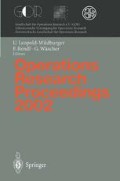Abstract
We describe a statistical procedure for testing the quality of a feasible candidate solut ion for an important class of stochastic programs. Quality is defined via the so-called optimality gap and th e procedure’s output is a confidence interval on this gap. We review a multiple-replications procedure for constructing the confidence interval. Then, we present a result that allows the procedure to be computationally simplified to a single-replication procedure.
Access this chapter
Tax calculation will be finalised at checkout
Purchases are for personal use only
Preview
Unable to display preview. Download preview PDF.
References
M. Bertocchi, J. Dupacova, and V. Moriggia. Sensitivity of bond portfolio’s behavior with respect to random movements in yield curve: A simulation study. Annals of Operations Research, 99:267–286, 2000.
J. Dupacova. On non-normal asymptotic behavior of optimal solutions for stochastic programming problems and on related problems of mathematical statistics. Kybemetika, 27:38–52, 1991.
J. Dupacova and R.J.-B. Wets. Asymptotic behavior of statistical estimators and of optimal solutions of stochastic optimization problems. The Annals of Stat istics, 16:1517–1549, 1988.
J.L. Higle and S. Sen. Statistical verification of optimality conditions for stochastic programs with recourse. Annals of Opemtions Research, 30:215–240, 1991.
J.L. Higle and S. Sen. Stochastic decomposition: an algorithm for two-stage linear programs with recourse. Mathematics of Operations Research, 16:650669, 1991.
J.L. Higle and S. Sen. Statistical approximations for stochastic linear programming problems. Annals of Operations Research, 85:173–192, 1999.
A.S. Kenyon and D.P. Morton. Stochastic vehicle routing with random travel times. Transportation Science, 2001. To appear.
A.J. King and RT. Rockafellar. Asymptotic theory for solutions in statistical estimation and stochastic programming. Mathematics of Operations Research, 18:148–162, 1993.
A.J. Kleywegt, A. Shapiro, and T. Homem-de-Mello. The sample average approximation method for stochastic discrete optimization. Stochastic Programming E-Print Series, 1999. http://www.dochost.rz.hu-berlin.dehu-berlin.de/spepsj
A.J. King and R.J.-B. Wets. Epi-consistency of convex stochastic programs. Stochastics, 34:83–91, 1991.
W.K. Mak, D.P. Morton, and R.K. Wood. Monte Carlo bounding techniques for determining solution quality in stochastic programs. Operations Research Letters, 24:47–56, 1999.
D.P. Morton and RK. Wood. On a stochastic knapsack problem and generalizations. In D.L. Woodruff, editor, Advances in Computational and Stochastic Optimization, Logic Programming, and Heuristic Search: Interfaces in Computer Science and Operations Research, pages 149--168. Kluwer Academic Publishers, Boston, 1998.
V.I. Norkin, G.Ch. Pflug, and A. Ruszczyriski. A branch and bound method for stochastic global optimization. Mathematical Programming, 83:425–450, 1998.
E. Popova and D. Morton. Adaptive stochastic manpower scheduling. In Proceedings of the Winter Simulation Conference, pages 661–668, 1998.
S.M. Robinson. Analysis of sample-path optimization. Mathematics of Operations Research, 21:513–528, 1996.
A. Shapiro and T. Hornem-de-Mello. A simulation-based approach to two-stage stochastic programming with recourse. Mathematical Programming, 81:301–325, 1998.
A. Shapiro. Asymptotic properties of statistical estimators in stochastic programming. The Annals of Statistics, 17:841–858, 1989.
A. Shapiro. Stochastic programming by Monte Carlo simulation methods. Stochastic Programming E-Print Series, 2001.http://www.dochost.rz.hu-berlin.de/spepsj
B. Verweij, S. Ahmed, A. Kleywegt, G. Nemhauser, and A. Shapiro. The sample average approximation method applied to stochastic vehicle routing problems: a computational study. (Working paper), 2001.
D.W. Watkins, Jr., D.P. Morton, and D.C. McKinney. Monte Carlo techniques for estimating solution quality in stochastic groundwater management models. In Proceedings of the XII International Conference on Computational Methods in Wat er Resources, Crete, pages 67–74, 1998.
G. Zakeri. Metaneos project: Verify optimization solver.http://www.unix.mcs.anl.gov/metaneosj/
Author information
Authors and Affiliations
Editor information
Editors and Affiliations
Rights and permissions
Copyright information
© 2003 Springer-Verlag Berlin Heidelberg
About this paper
Cite this paper
Morton, D.P. (2003). Testing Solution Quality in Stochastic Programs. In: Leopold-Wildburger, U., Rendl, F., Wäscher, G. (eds) Operations Research Proceedings 2002. Operations Research Proceedings 2002, vol 2002. Springer, Berlin, Heidelberg. https://doi.org/10.1007/978-3-642-55537-4_64
Download citation
DOI: https://doi.org/10.1007/978-3-642-55537-4_64
Publisher Name: Springer, Berlin, Heidelberg
Print ISBN: 978-3-540-00387-8
Online ISBN: 978-3-642-55537-4
eBook Packages: Springer Book Archive

